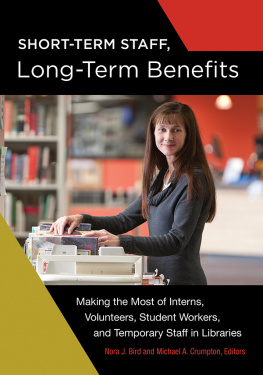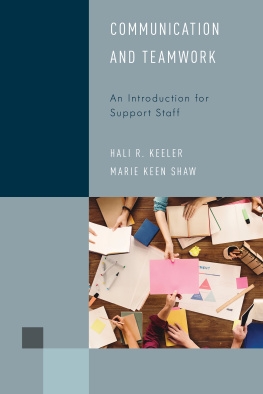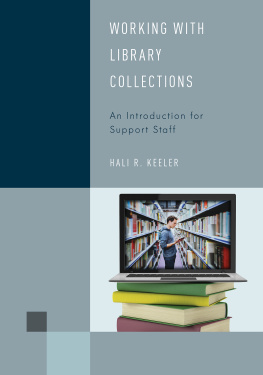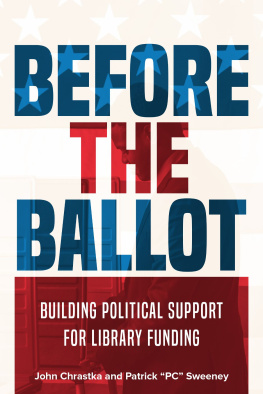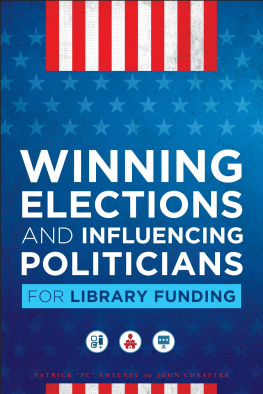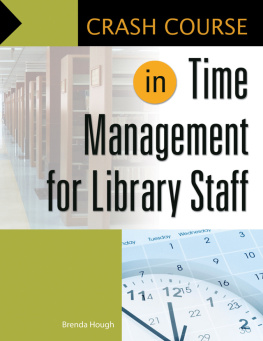SHORT-TERM STAFF, LONG-TERM BENEFITS
Making the Most of Interns, Volunteers, Student Workers, and Temporary Staff in Libraries
Nora J. Bird and Michael A. Crumpton, Editors

Copyright 2018 by Nora J. Bird and Michael A. Crumpton
All rights reserved. No part of this publication may be reproduced, stored in a retrieval system, or transmitted, in any form or by any means, electronic, mechanical, photocopying, recording, or otherwise, except for the inclusion of brief quotations in a review, without prior permission in writing from the publisher.
Library of Congress Cataloging-in-Publication Data
Names: Bird, Nora J., editor. | Crumpton, Michael A., editor.
Title: Short-term staff, long-term benefits : making the most of interns, volunteers, student workers, and temporary staff in libraries / Nora J. Bird and Michael A. Crumpton, editors.
Description: Santa Barbara, California : Libraries Unlimited, an imprint of ABC-CLIO, LLC, [2018] | Includes bibliographical references and index.
Identifiers: LCCN 2018013916 (print) | LCCN 2018035912 (ebook) | ISBN 9781440841774 (ebook) | ISBN 9781440841767 (hard copy : alk. paper)
Subjects: LCSH: Interns (Library science) | Volunteer workers in libraries. | Student library assistants. | Library personnel management.
Classification: LCC Z682.4.I58 (ebook) | LCC Z682.4.I58 S56 2018 (print) | DDC 023dc23
LC record available at https://lccn.loc.gov/2018013916
ISBN: 9781440841767 (paperback)
9781440841774 (eBook)
22 21 20 19 181 2 3 4 5
This book is also available as an eBook.
Libraries Unlimited
An Imprint of ABC-CLIO, LLC
ABC-CLIO, LLC
130 Cremona Drive, P.O. Box 1911
Santa Barbara, California 93116-1911
www.abc-clio.com
This book is printed on acid-free paper 
Manufactured in the United States of America
Contents
Nora J. Bird and Michael A. Crumpton
Nora J. Bird
Nora J. Bird
David Gwynn
Michael A. Crumpton
Mark Coltrain
Michael A. Crumpton and Nora J. Bird
Katrina C. Vernon
Kathelene McCarty Smith and Keith Phelan Gorman
Nora J. Bird and Michael A. Crumpton
Introduction
The genesis of this book was the work that the authors did together on the Real Learning Connections project (Bird and Crumpton 2014). That internship that was created from the combination of resources from the University of North Carolina at Greensboro (UNCG) library and information studies (LIS) department and the University Libraries (UL) at UNCG was different. It was focused not just on the student who completed the work but also on the librarian who supervised and the library faculty member who observed and participated. provides details on the six years that the project was in existence, but the main thing learned through that experience is at the heart of this book. Real learning must be the primary outcome sought when a person is brought into an organization for a short-term experience. It is good for the person, and it benefits the organization, as well.
The phrase short-term staffing was selected so that a range of different opportunities could be examined in one volume. Some short-term arrangements are paid, but many are performed by volunteers. Some volunteer work, like practica that earn course credit in a masters program, is specifically designed to encompass learning experiences. But information organization managers may not think about the learning embedded in working with teenagers to fulfill their high school service learning hours. What might the organization learn about teen reading habits and style of engagement from these short encounters? Best practices for being prepared for any of these many variations are described and their implications considered in this book.
Learning is not only what happens during formal education. For many learning theorists who are introduced in , especially Kolb (2014), real learning only happens when people engage in an experience. There are two sides that learn during that time together. That is a tenet that will be repeated throughout every chapter written here.
Several coauthors were invited to contribute chapters that add context to the types of short-term staffing arrangements considered. Grant personnel, virtual internships, public libraries and archives, and special collections are covered separately by practitioners working with these different personnel within specific contexts. Michael Crumpton wrote the main part of the academic library chapter because of his long tenure in administering a large university library and his expertise with human resource management, and we included information about the Real Learning Connections Project to illustrate the far-reaching effects of that endeavor.
The term long-term benefits is used to recognize the organizational value that can be gained from the proper use of short-term staffing. Organizational learning takes place when change occurs, and the organization acquires experience (Argote and Miron-Spektor 2011). The experiences that short-term personnel can bring will create long-term organizational value if properly perceived and introduced into the organizational culture. Some examples of how this could happen include the following:
- Bridge student work into professional work that will be recognized as such by librarians and staff within the organization.
- Provide a forum for practicing librarians to have an insight into current theory and LIS curricula to refresh skills and professional outlooks.
- Provide a forum for library staff to interact with short-term personnel in order to collaborate with them and gain from their perspective.
- Move forward a project that is a small incremental part of the librarys mission and service to the community by providing librarians an academic connection to doing research on related activities.
- Be inclusive of part-time staff as full members of the organization.
The organization must think beyond the status quo in order to remain relevant and move the mission forward. The evolution of the profession toward specialized needs and focused career talents and skills requires the ability to maintain core values while reinventing the methods by which they are learned and maintained (Cox and Corrall 2013). Job descriptions that never change do not recognize changing organizational needs, and short-term situations can provide the testing ground for revisions that will serve into the future.
Learning from those who are there to learn themselves means not only recognizing but also proactively developing programs that train supervisors to integrate knowledge and skills of students and time-limited staff into the work culture of the organization. This can strategically provide a learning experience for members of the organization that breaks the static cycle (Stinehelfer and Crumpton 2010).
Strategic change requires leadership that must first recognize the need for change based on assessment and evidence from information garnered for consideration. By providing and managing the opportunities for short-term staffing, organizational leadership can leverage those experiences gained into broader benefits for existing permanent staff, including succession planning and strategic repositioning as needed.
There are other books about working with volunteers and other short-term arrangements, as are covered here. The unique contribution is that, in an environment of constant change, organizations must be constantly willing to learn and grow from their collaborations with others. This book is designed to help organizations maximize the benefits that can emerge from taking on the responsibility of working with someone for a short-term assignment.

